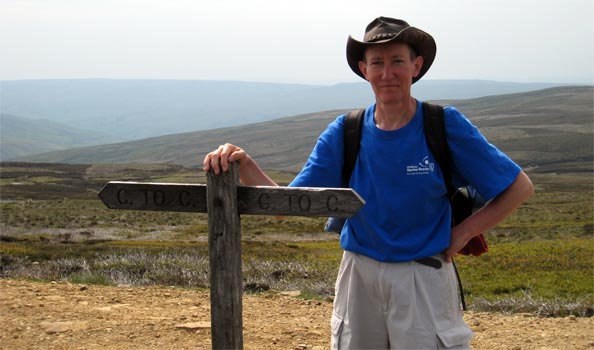
Holocaust Denkmal, Berlin, Germany
Hilary is currently Associate Professor of European History at Nipissing University, North Bay, Ontario. She has published a fair amount since coming to Nipissing in 2005. Her book, The Nuremberg SS-Einsatzgruppen Trial, 1945-1958: Atrocity, Law, and History, was published in 2009-2010 by Cambridge University Press. It won the 2010 Hans Rosenberg Prize for best book in German History, in the conference group for Central European History at the American Historical Association. It was based on the research she did for her dissertation that the O’Brien Foundation helped to support.
She has also published a number of articles including:
"Good Germans and Bad Nazis: The fate of SS-Einsatzgruppen Commander Martin Sandberger in Postwar Germany" forthcoming in Nazi Self-Help and Recast Identities.
"Prosecuting Genocide before the Genocide Convention: Raphael Lemkin and the Nuremberg Trials, 1945-1949" forthcoming, Journal of Genocide Research.
"Beweise, Zeugen, Narrative: Der Einsatzgrupen Prozess und seine Wirkung auf die historische Forschung zur Genese der Endlosung," in NMT. Die Nurnberger Militartribunale zwischen Geschichte (2013).
“A Judge, a Prosecutor, and a Mass Murderer: Dynamics in the SS-Einsatzgruppen Trial,” in Kim Christian Priemel and Alexa Stiller (eds.), Reassessing the Nuremberg Military Tribunals. Transitional Justice, Trial Narratives, and Historiography (New York and Oxford: Berghahn Books and Oxford University Press, 2008): 47-73.
“Biographies of Criminals or Criminal Biographies: Explaining Perpetrators’ ‘Route to Crime’ using War Crimes Trial Documentation,” in Simone Lässig and Volker Berghahn (eds.), Biography between Structure and Agency: Approaches to German History (New York and London: Berghahn Books and Oxford University Press, 2008): 162-181.
“Confessions of Wrong-doing or How to save yourself from the Hangman? An Analysis of British and American Intelligence Reports of the Activities of Otto Ohlendorf, May-December 1945,” in David Bankier (ed.), Secret Intelligence and the Holocaust (New York and Jerusalem: Enigma Books and Yad Vashem, 2006): 301-326.
"Scales of Justice: History, Testimony and the Einsatzgruppen Trial,” in Jeffry Diefendorf, (ed.), Lessons and Legacies VI. New Currents in Holocaust Research (Evanston, IL: Northwestern University Press, 2004): 325-351.
She has also won a teaching award, been the chief negotiator for the Nippising University Faculty Association, and is on the editorial board of The Historian. She is an active scholar.
(705) 474-3450 ext. 4476
This email address is being protected from spambots. You need JavaScript enabled to view it.



 Dr. Sherry L. Beaumont received funding from the O’Brien Foundation to complete graduate studies at the University of Waterloo, where she was granted a Ph.D. in Psychology in 1993. She is currently a Full Professor at the University of Northern British Columbia (UNBC) where she teaches and conducts research in the areas of positive psychology and lifespan development. She has held research grants, published, and supervised many graduate students in the areas of self-identity and emotional well-being across the lifespan. Most recently, her research has investigated the role of self-identity for the development of wisdom, spirituality, and life meaning. Her research articles have been published in scholarly journals, such as Identity: An International Journal of Theory and Research and the Journal of Adult Development, and have been featured in media sources, such as the University of Chicago’s “Defining Wisdom Research Network.” Most recently, Dr. Beaumont is in the process of developing an intervention for positive identity development during emerging adulthood that focuses on the benefits of self-expression using verbal and visual imagery. This research will incorporate her recent training in art therapy. For more information, see
Dr. Sherry L. Beaumont received funding from the O’Brien Foundation to complete graduate studies at the University of Waterloo, where she was granted a Ph.D. in Psychology in 1993. She is currently a Full Professor at the University of Northern British Columbia (UNBC) where she teaches and conducts research in the areas of positive psychology and lifespan development. She has held research grants, published, and supervised many graduate students in the areas of self-identity and emotional well-being across the lifespan. Most recently, her research has investigated the role of self-identity for the development of wisdom, spirituality, and life meaning. Her research articles have been published in scholarly journals, such as Identity: An International Journal of Theory and Research and the Journal of Adult Development, and have been featured in media sources, such as the University of Chicago’s “Defining Wisdom Research Network.” Most recently, Dr. Beaumont is in the process of developing an intervention for positive identity development during emerging adulthood that focuses on the benefits of self-expression using verbal and visual imagery. This research will incorporate her recent training in art therapy. For more information, see 